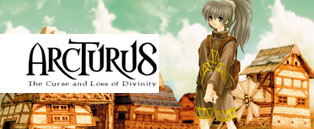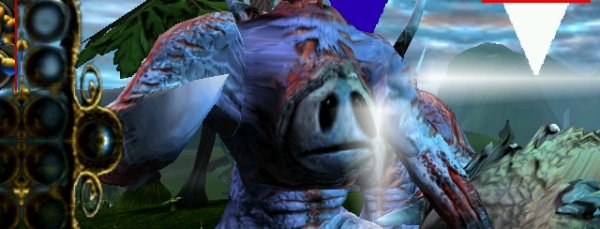Seen from a different time, a different view,
the world becomes a misty dream and sets me free.
...
A sight for which no eyes are sufficient,
a touch for which no fingertips are adequate.
(Lyrics of a song in Ragnarok)
Computer-generated virtual realities (i.e., games) initiated my academic drive and have fundamentally shaped who I am.
|
|
|
|
I have to start off with a disclaimer: I am not a so-called "video game junky", whose conventional image is a hairy, unfit boy-man sitting in front of a screen all day long holding a controller pad, the mouth half-open. I view it tragic that the term game has come to carry a pejorative tone, which is the reason I avoid using it when I broach this subject to people. (Still, as soon as they realize what I'm talking about, they look at me with disbelief and some disappointment.) And justifiably so – many, if not most, games are nothing but mindless entertainment whose main purpose is to provide the player with a comfortable setting in which they do some repetitive work, so that they have the illusion of fulfillment. This puts me in a difficult position. I can't identify myself as a typical "gamer", but I still regard games to be of utmost importance.
What I see in games is the dissolution of boundaries between different worlds.
Think about it. We only live once (I think), in this particular world called Earth at this particular time of the 21st century. As a student of history, I know this world has an extremely convoluted story (and a pretty screwed up one at that) to offer, ranging from the French Revolution to modern daily politics. But I often feel so trapped here. Trapped by gravity, by my origins and physical appearance, by the fact that I can't use Force like a Jedi in the Star Wars series, and by the configuration of the world that is utterly unfair (some born healthy, smart, wealthy; others born maimed, retarded, poor), which we can do nothing about but quietly submit to.
However, there can be many other worlds to which we have access through imagination. One life is not enough. This lies at the heart of all imaginative endeavors of human civilization, such as novels, plays, songs, and paintings. I believe that game is the ultimate stage of the endeavor. Besides the fact that every other form of endeavor is a subset of this (we can associate the story part of a game with novels/plays, the sound part with songs/music, the graphics part with art/paintings, and so forth---reaching the conclusion that games are in fact culture-complete!), I have personally witnessed the potential through various games: they were more impressive, whimsical, poignant, beautiful, sorrowful, or even evil than our real world could ever be. For illustration, I will introduce three games. But keep in mind that I can't hope to convey all my points by this summary. No matter how much I praise them, you won't understand until you play through them: by the definition of the medium.
Arcturus: The Curse and Loss of Divinity

Published in 2000 by Gravity and Sonnori, this role-playing game of epic scale marks the apogee of Korean
package games. (Unfortunately, the prevalence of illegal online downloads have
virtually decimated the market, and now almost all Korean games are merely copies of
isomorphic MMOs.) It is probably my all-time favorite.
It traces the development and metamorphosis of some of the most unforgettable characters that I know of. The main characters, Sizz Flair (in the banner above) and Maria Kates are childhood friends in the quiet town of Ragnie, although most of the time Sizz is simply used by Maria. The former is an extremely introvert boy who is often confused as a girl due to his look, while the latter is extremely extrovert girl who is often misunderstood as a boy due to her personality. This sort of gender-mixing came as a big culture shock to me. It's interesting how outrageously anti-Christian the world is (especially considering the fact that the game was made in Korea). Not unlike the time of Galileo, the church brutally suppresses its opponents; in fact, Sizz's mother was tortured to death by a priest who wanted to take Sizz under his command.
|
|
|
The story begins when Maria succeeds in persuading Sizz to leave Ragnie for city life. Their escapade from home is ensued by encounters with people of different goals, leading to paths that they initially didn't foresee. In the middle of the game the world is torn apart. Through unbelievable turmoils and incredible sadness of the world, everything becomes upside-down; Sizz is now a cruel, callous man and Maria is a shy, reserved girl. We have a number of other truly interesting characters besides Sizz and Maria who have their own complicated stories. They all strive to find meanings and happiness in a world crumpled with hilarity, cruelty, pain and joy.
One may say that this is a typical story template, but my memory of the world of Arcturus is so unlike that of any other. It is an enormous world of ridiculous complexity, enriched by deep relations that develop among characters (and between them and the player) through 60 hours of play, presented with amiable graphics, humor, seriousness, and beautiful music. I find it so heartbreakingly attractive that I'm quite willing to devote my life to the creation of such worlds.
Sacrifice

This is a completely different line of work. Sacrifice is what I would call a game simply too ahead of its time.
You are a lost wizard hoping to regain the track of life. The world is governed by five gods (one is a goddess) – of life, earth, air, fire, and death. You have to choose one and contribute to his or her godly plan by fighting or sometimes assisting other gods. The game mechanics was a breakthrough; it combined the real-time strategy playing with that of the third-person shooter, presented in an awe-inspiring world of mountains and sky that resounded with gloriously orchastrated music. The design of creatures was simply outstanding. Look at the headless creature in the above banner, or the troll below. I'm still not sure how these out-of-place, fantastical renderings could create such a coherent world: kudos to the designers.
My alias Stratos is the god of the air in this game.
|
|
|
He is a kind of mediating god in the middle, but with his own mind. Broadly, the gods are divided into two groups: life and earth versus fire and death. Stratos chooses to take no side, but operates on his own will to fulfill his own purposes. I guess I was attracted to his independence and, most important, his hilarious appearance.
It's sad that this revolutionary game design has not been pushed further. People are too busy playing mindless repetitions of good-looking video games. My hope is that someday, Sacrifice will regain its rightful position in game history. If you're interested, I recommend reading the making of Sacrifice.
Max Payne
|
|
|
Published in 2001 by Remedy, Max Payne is probably well-known for its effective presentation of New York City as a dark, drug-ridden place for noir drama. The main character, Max Payne, is characterized by such grief, pain, and determination that we cannot help but empathize with him throughout the play. After his wife is murdered by junkies addicted to a new kind of drug, Max, previously an NYPD, withdraws from the police and starts his own search for the source of the drug. In the journey, he meets several intriguing figures (such as the Russian mob boss, Vladimir, shown in a graphic novel slide on the right), fights his way through practically all gangs of NYC, and attains his revenge. His story is a tempest of anger, confusion, betrayal, and hypnosis. The comic-style narration of story also blends well into the hostile world depicted in the game, resulting in a powerful experience.
What Makes Good Games?
Now I have written a lot, but honestly it's rather pointless to tell about my experience of playing these games, because a game's journey is meaningful only to the traveler alone. But there is a common thread that accompanies every exceptional game in my memory: zero tolerance for mediocrity. Every aspect of the game must be flawless. A truly strong game nails down everything – story, art, music, ambience, interface, performance optimization, etc. The reason is simple: a game is more than a sum of its elements. All elements work together to create a synergic effect, and therefore if one element is missing the synergy breaks.I expect much more from games in the coming years. And, ultimately, they will take their place as perhaps the most significant heritage of human civilization, and I'm eager to participate in their ascent.

